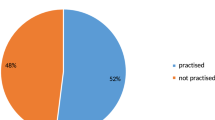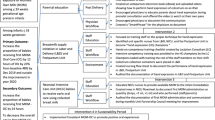Abstract
Objective:
Whether postpartum visits by trained community health workers (CHWs), reduce newborn breastfeeding problems.
Method:
Community health workers made antenatal and postpartum home visits promoting newborn care practices including breastfeeding. CHWs assessed neonates for adequacy of breastfeeding and provided hands-on support to mothers to establish breastfeeding. History and observation data of 3495 neonates were analyzed to assess effects of CHW visitation on feeding problems.
Result:
Inappropriate breastfeeding position and attachment were the predominant problems (12 to 15%). Only 6% of newborns who received home visit by CHWs within 3 days had feeding difficulties, compared to 34% of those who did not (odds ratio: 7.66, 95% confidence interval (CI): 6.03 to 9.71, P=0.00). Latter group was 11.4 times (95% CI: 6.7 to 19.3, P=0.00) more likely to have feeding problems as late as days 6 to 7, than the former.
Conclusion:
Counseling and hands-on support on breastfeeding techniques by trained workers within first 3 days of birth, should be part of community-based postpartum interventions.
This is a preview of subscription content, access via your institution
Access options
Subscribe to this journal
Receive 12 print issues and online access
$259.00 per year
only $21.58 per issue
Buy this article
- Purchase on Springer Link
- Instant access to full article PDF
Prices may be subject to local taxes which are calculated during checkout


Similar content being viewed by others
References
Hanson LA . Breastfeeding provides passive and likely long-lasting active immunity. Ann Allergy Asthma Immunol 1998; 81: 523–533; quiz 533–534, 537.
Oddy WH . Breastfeeding protects against illness and infection in infants and children: a review of the evidence. Breastfeed Rev 2001; 9: 11–18.
Victora CG, Smith PG, Vaughan JP, Nobre LC, Lombardi C, Teixeira AM et al. Infant feeding and deaths due to diarrhea. A case–control study. Am J Epidemiol 1989; 129: 1032–1041.
Lucas A, Morley R, Cole TJ, Lister G, Leeson-Payne C . Breast milk and subsequent intelligence quotient in children born preterm. Lancet 1992; 339: 261–264.
Jones G, Steketee RW, Black RE, Bhutta ZA, Morris SS . How many child deaths can we prevent this year? Lancet 2003; 362: 65–71.
Edmond KM, Zandoh C, Quigley MA, Amenga-Etego S, Owusu-Agyei S, Kirkwood BR . Delayed breastfeeding initiation increases risk of neonatal mortality. Pediatrics 2006; 117: e380–e386.
Renfrew MJ, Lang S, Woolridge MW . Early versus delayed initiation of breastfeeding. Cochrane Database Syst Rev 2000, issue no. 2, CD000043.
National Institute of Population Research and Training (NIPORT), Mitra and Associates Macro O . Bangladesh Demographic and Health Survey 2004. National Institute of Population Research and Training (NIPORT), Mitra and Associates, ORC Macro: Dhaka, Bangladesh, 2005.
Ahmed FU, Rahman ME, Alam MS . Prelacteal feeding: influencing factors and relation to establishment of lactation. Bangladesh Med Res Counc Bull 1996; 22: 60–64.
DiGirolamo AM, Grummer-Strawn LM, Fein S . Maternity care practices: implications for breastfeeding. Birth 2001; 28: 94–100.
Marandi A, Afzali HM, Hossaini AF . The reasons for early weaning among mothers in Teheran. Bull World Health Organ 1993; 71: 561–569.
Coutinho SB, de Lira PI, de Carvalho Lima M, Ashworth A . Comparison of the effect of two systems for the promotion of exclusive breastfeeding. Lancet 2005; 366: 1094–1100.
WHO/Unicef. Protecting, Promoting and Supporting Breastfeeding: the Special Role of Maternity Services: A Joint WHO/Unicef Statement. WHO: Geneva;, 1989.
UNICEF. Take the Baby Friendly Initiative. UNICEF: New York, 1991.
Ahmed S, Parveen SD, Islam A . Infant feeding practices in rural Bangladesh: policy implications. J Trop Pediatr 1999; 45: 37–41.
Quinn VJ, Guyon AB, Schubert JW, Stone-Jimenez M, Hainsworth MD, Martin LH . Improving breastfeeding practices on a broad scale at the community level: success stories from Africa and Latin America. J Hum Lact 2005; 21: 345–354.
Bryce J, el Arifeen S, Pariyo G, Lanata C, Gwatkin D, Habicht JP . Reducing child mortality: can public health deliver? Lancet 2003; 362: 159–164.
Ingram J, Johnson D, Greenwood R . Breastfeeding in Bristol: teaching good positioning, and support from fathers and families. Midwifery 2002; 18: 87–101.
Winch PJ, Alam MA, Akther A, Afroz D, Ali NA, Ellis AA et al. Local understandings of vulnerability and protection during the neonatal period in Sylhet District, Bangladesh: a qualitative study. Lancet 2005; 366: 478–485.
Philipp BL, Merewood A, Miller LW, Chawla N, Murphy-Smith MM, Gomes JS et al. Baby-friendly hospital initiative improves breastfeeding initiation rates in a US hospital setting. Pediatrics 2001; 108: 677–681.
Haider R . The baby-friendly hospital initiative and activities in Bangladesh. Bangladesh J Child Health 1993; 12: 72–74.
World Health Organization. Essential Newborn Care and Breastfeeding. World Health Organization: Geneva, Switzerland, 2002.
McKeever P, Stevens B, Miller KL, MacDonell JW, Gibbins S, Guerriere D et al. Home versus hospital breastfeeding support for newborns: a randomized controlled trial. Birth 2002; 29: 258–265.
Hoddinott P, Lee AJ, Pill R . Effectiveness of a breastfeeding peer coaching intervention in rural Scotland. Birth 2006; 33: 27–36.
Haider R, Ashworth A, Kabir I, Huttly SR . Effect of community-based peer counsellors on exclusive breastfeeding practices in Dhaka, Bangladesh: a randomised controlled trial [see commments]. Lancet 2000; 356: 1643–1647.
Colin WB, Scott JA . Breastfeeding: reasons for starting, reasons for stopping and problems along the way. Breastfeed Rev 2002; 10: 13–19.
Acknowledgements
We thank the study participants in Sylhet District Bangladesh who were generous with their time and patience with CHWs through the sessions of observation and interviews. We thank Dr Mahbub E Elahi Chowdhury of Reproductive Health Unit, ICDDR, Bangladesh who provided advice on statistical issues. Funding for the PROJAHNMO Project was provided by the United States Agency for International Development through the Family Health and Child Survival Cooperative Agreement, Global Research Activity Cooperative Agreement, and the USAID Mission in Dhaka, Bangladesh, and the Saving Newborn Lives initiative of Save the Children Federation—USA through a grant from the Bill and Melinda Gates Foundation.
Author information
Authors and Affiliations
Consortia
Corresponding author
Additional information
Contributors: IM conceptualized the current analysis, SMR developed manuals and trained CHWs, AS performed the literature review. IM did the data analysis, IM and AS wrote the draft manuscript and further modifications. AHB, GLD, SEA and HRS designed the protocol for the parent study, reviewed the study instruments and the results of the study. AHB, PW and GLD provided feedback on the analysis and made critical suggestions on the manuscript. All authors reviewed the manuscript.
Conflict of interest
The authors declare that they have no conflict of interest arising through participation in this study.
Rights and permissions
About this article
Cite this article
Mannan, I., Rahman, S., Sania, A. et al. Can early postpartum home visits by trained community health workers improve breastfeeding of newborns?. J Perinatol 28, 632–640 (2008). https://doi.org/10.1038/jp.2008.64
Received:
Revised:
Accepted:
Published:
Issue Date:
DOI: https://doi.org/10.1038/jp.2008.64
Keywords
This article is cited by
-
Acceptability and operational feasibility of community health worker-led home phototherapy treatment for neonatal hyperbilirubinemia in rural Bangladesh
BMC Pediatrics (2024)
-
The effect of counseling with stress management approach on postpartum anxiety and distress and breastfeeding self-efficacy during COVID-19 pandemic: a ramdomized controlled trial
BMC Pregnancy and Childbirth (2023)
-
Knowledge and practice of essential newborn care and associated factors among women in Ethiopia: systematic review and meta-analysis
Reproductive Health (2022)
-
Breastfeeding technique and associated factors among breastfeeding mothers in Harar city, Eastern Ethiopia
International Breastfeeding Journal (2018)
-
Cup Feeding as a Supplemental, Alternative Feeding Method for Preterm Breastfed Infants: An Integrative Review
Maternal and Child Health Journal (2018)



